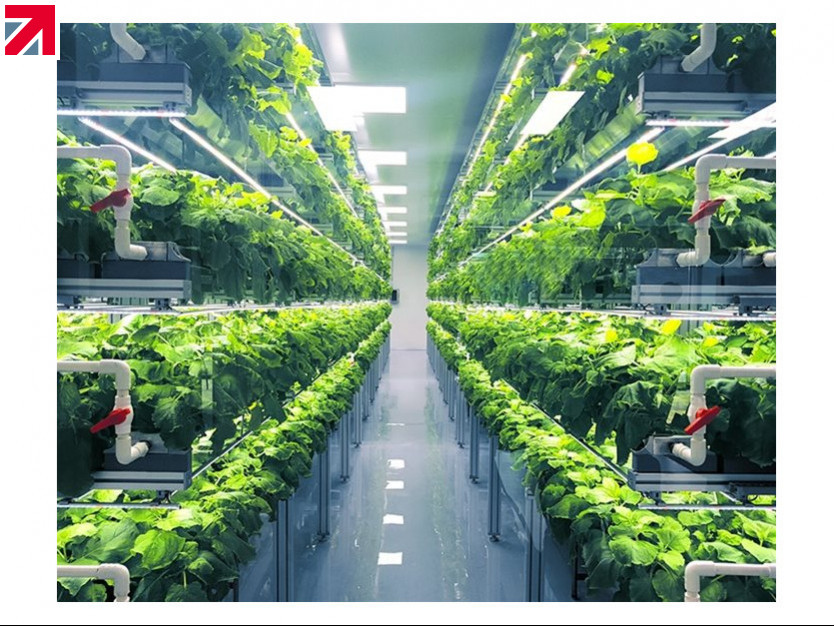We are all becoming increasingly aware of the need to think about our carbon footprint and living more sustainably.
It is estimated that the UK currently imports around 48% of its food which, across the population, results in a lot of food miles. Growing more food within the UK would have a positive impact but, with our variable climate and a lack of space to grow the number of crops needed, this isn’t always possible.
In answer to this growing problem, a quiet revolution is currently taking over the farming world with Vertical Farming.
Why Vertical Farming?
You may not have heard of it before, but the methodology is quite simple. Instead of traditional methods using large fields or greenhouses, vertical farming moves the process indoors. Crops are grown in large warehouse structures with crops grown in trays stacked on multiple levels and all their light, heat and water requirements controlled automatically.
This gets over a lot of the problems associated with traditional farming methods where you need plenty of lush, green space and the type of food you can grow controlled by the seasons.
Vertical farming removes a lot of these restrictions. The space efficient technique makes it possible to locate the farms in practically any climate and location, from a large warehouse to a small shipping container and even unused brownfield sites, the only requirement is that the area is flat. The controlled environment enables a wide range of crops to be available all year round. This makes it possible to achieve up to 250 times greater yield from the same area of land in comparison to field grown produce.
Experts in Storage Equipment
We may not be experts in growing food, but we know a lot about racking (over 70 years’ worth of experience across a wide range of sectors and industries). We are currently installing one of the World’s largest vertical farm solutions utilising Link51 pallet racking.
Stewart Adams, Sales Director for Pallet Racking talks more about the project, “The racking used for vertical farming is our standard pallet racking, configured to house a dynamic tray handling system and interface with a bespoke ASRS (Automated Storage and Retrieval System). The final design was achieved after a significant period of development with the end user, automation supplier and tray manufacturers. As with all successful storage projects the correct selection of materials and specification needs to be achieved.”
The system must be fit for purpose and designed to work within the conditions of the environment while also making full use of the space. And with constant turnaround of produce you need to know it will be up to the job – the last thing you need is down time because the racking no longer works!
We are currently working closely with our clients to deliver a storage structure for one of the world’s largest vertical farms. Developing a scalable system is critical for this project and the design not only interfaces with a bespoke ASRS but incorporates a “closed” irrigation system and energy efficient LED lighting.
Sustainable farming, sustainable racking
One of the major advantages to vertical farming is that it improves sustainability. Food can be moved closer to where it is needed, such as big cities, the food travels fewer miles and dramatically reduces carbon footprint and cost of logistics. In the controlled growing environment, fruit and vegetables no longer rely on pesticides or chemicals and they need less water (only 5% of the water compared to field-grown crops) as the closed loop irrigation system only uses water absorbed by the plants.
At Whittan we believe that sustainable farming methods must be supported by environmentally friendly storage equipment. Almost half of the UK’s carbon footprint comes from emissions associated with imports to the UK. Buying products manufactured in Britain makes much more sustainable sense. Our racking, shelving, and lockers are manufactured here in the UK which means we’re never far away from our customers.
We also recognise that carbon input can be improved by maximising the expected lifespan of our equipment. Our solutions meet British Standard requirements and British Safety Council Certifications and we are also Full Manufacturing SEMA Members. These credentials provide clear evidence that the design and manufacture of our products have been independently assessed to meet industry standards. Delivering to the highest levels quite simply means our equipment will deliver on its expected lifespan.
See how Whittan can help!
If you’re planning your Vertical Farming facility, get in touch with one of our experts today to see how we can help you make a big difference. We can visit your site free of charge and work with you to design a bespoke solution that meets your needs. Call 01952 682251, email enquiries@whittan.com or visit www.whittan.com for more information.
Find out more about Whittan Group on their member profile page here
Member-created content 2 years ago | From members
